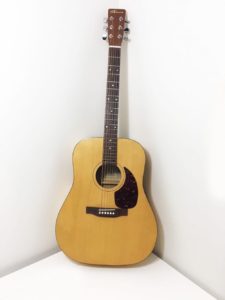I picked up my guitar one evening last week.
I bought it several years ago with a tax refund, remembering how I always wanted to learn to play. 
I pulled it out a few times early on, closely watching some on line videos to teach myself how to hold my fingers on the strings.
Since then it has mostly sat in a corner gathering dust.
And so it was that not long ago I had a few days off and thought maybe I should try again.
It didn’t go well.
Oh, it is not that I am unfamiliar with music. I was fortunate to have ten years of piano lessons as a child. For a number of years I actually took it seriously, putting in my practice hours to the point where I wasn’t half bad. I sang in choirs in Junior High and High School and still take my place in the alto section of a church choir from time to time. I know keys and key changes and I can tell when the score calls to repeat, to get softer and louder, and when to slow down and where to speed up. With all of those years of piano lessons, I acquired some muscle memory at the keyboard. And yet, with all of this, the guitar is foreign to me. I find myself squinting at and enlarging the fingering diagrams in my digital ‘teach yourself guitar’ book. I might get one chord to sound halfway decent, but I seem to not have a hope of transitioning to another one smoothly.
I need a teacher, else that guitar will find its way back into the corner where it will continue to gather dust.
And isn’t this always the case for anything that matters? Don’t we always need someone to first show us how it’s done? Don’t we first need to listen to “music” played well so that we have a sense of what to approximate in our own playing, with our own voices, in our own lives?
And isn’t this also so in what Jesus calls us to today?
Oh, it is so that we think we know what it is to love. And yes, there are certainly forms of human love which surely come close to emulating the sort of self-giving, sacrificial love which Jesus points us to today — that of a parent for a child, for instance. Indeed, it must be so that God puts something into that powerful connection in order to give the newly born — undoubtedly the most vulnerable among us — a chance. Most love, though, is voluntary. Eventually even between parents and children. And much of it, at least as we know it and live it most of the time, can be awfully self serving.
We need a teacher.
One who will walk alongside us first teaching us the basics.
Not one to show us how to hold our fingers, but how to extend our hearts.
One to help us know when it is time to be more quiet and when to speak.
A teacher who can show us how to slow down and how best to speed up for the sake of the other. For the sake of love.
We need a teacher who will model for us what it is to live the sort of love which will actually die for another, as Jesus offers now.
It seems to me that in some ways it is not so different from being a novice musician.
We won’t get it right the first time. Or the second. Or maybe even the fiftieth.
We will work and work to hold our fingers, our hearts, just so. Or to hold the correct posture, for in fact, music, like love comes from our whole beings.
We will need to practice and practice and practice.
And through it all, we will be wise to hold before ourselves an image of what perfect love looks like, sounds like, acts like, lives like.
And oh, we are reminded today that the gift and wonder is that you and I have been given precisely this.
We have already been given a Teacher to show us how to love.
- So now what shall we do?
- How shall we begin to love as Jesus did?
- What image of the ‘love of Jesus’ might you hold before yourself as you practice loving as he did?
- Where and with whom and in what circumstance are you being called to love in this way? Hold just one of those in your mind’s imagination now. Consider how you might practicing loving there.
- And how are our communities of faith called to give attention and space to practicing to learn to love as Jesus did? What might that look like where you live and serve?

Great simile. Love it! Encore!
Thanks, Judy!
Thanks for this rich metaphor, Janet. As a new guitar player about 50 years ago, I was reminded, “Everything worth doing is worth doing poorly.” It got me through the sore fingers, slow changes, and muted strings. I wonder how many hear the high calling to love one another and shrug it off because even doing it poorly can be so hard. I suppose it takes a certain amount of faith to believe that playing an instrument can be learned–we listen to the best players and it sounds like magic, a gift delivered fully formed, and for some very few it may be. To love well comes so easily to some, at least it appears that way. For the rest of us, we love difficult people poorly, then a little better, then a little better.
Thank you, Neill, for going a little deeper with the metaphor. I will carry your words with me in the days to come: “Everything worth doing is worth doing poorly.” Indeed.